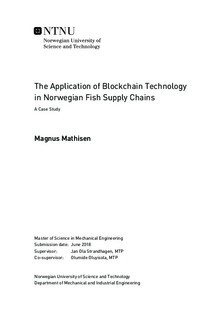The Application of Blockchain Technology in Norwegian Fish Supply Chains - A Case Study
Master thesis
Permanent lenke
http://hdl.handle.net/11250/2561323Utgivelsesdato
2018Metadata
Vis full innførselSamlinger
Sammendrag
The work conducted for this thesis is meant to benefit both industry and the scientific community. Creating an assessment for blockchain technology in a specific industrial (supply chain) setting and later expand to a more general setting might prove useful for companies planning to use blockchain in the future or wanting to understand blockchain technology better. There is scarce academic research on blockchain technology in fields besides computer science and finance. Expanding the research territory is key to understand this new technological trend and in the case of supply chain management, blockchain technology might prove to be a key technological development in the years to come. This thesis is formed as an assessment of the strategic fit of blockchain technology in Norwegian fish supply chains. Further, the key findings from this specific strategic fit is used to find indicators for which types of supply chains blockchain technology could bring positive strategic implications. The thesis is structured so that relevant scientific theory and data is presented before making an assessment of the strategic fit and discussing the implications. Using the theory on supply chain management Fisher (1997) and Lee (2002) and key supply chain management objectives together with theory on innovation, through Rogers (1962), the following research questions were answered.
RQ1: Why is blockchain technology beneficial for fish supply chains?RQ1.1: How is it beneficial?RQ1.2: Does the findings indicate benefits for other supply chains?
The research arrived at the conclusion that Norwegian fish supply chains might benefit from blockchain technology. This is mainly a conclusion drawn by the fact that Norwegian aquaculture producers were viewed to have lean supply chains and have functional products in the material flows as found through the models of Fisher (1997) and Lee (2002), and that the supply chain management objectives cost, quality and sustainability, with the cost and quality being integral to lean supply chain practices, were found to get the highest advantages. In addition, blockchain technology was found to benefit lean supply chains in general, especially food supply chains.
